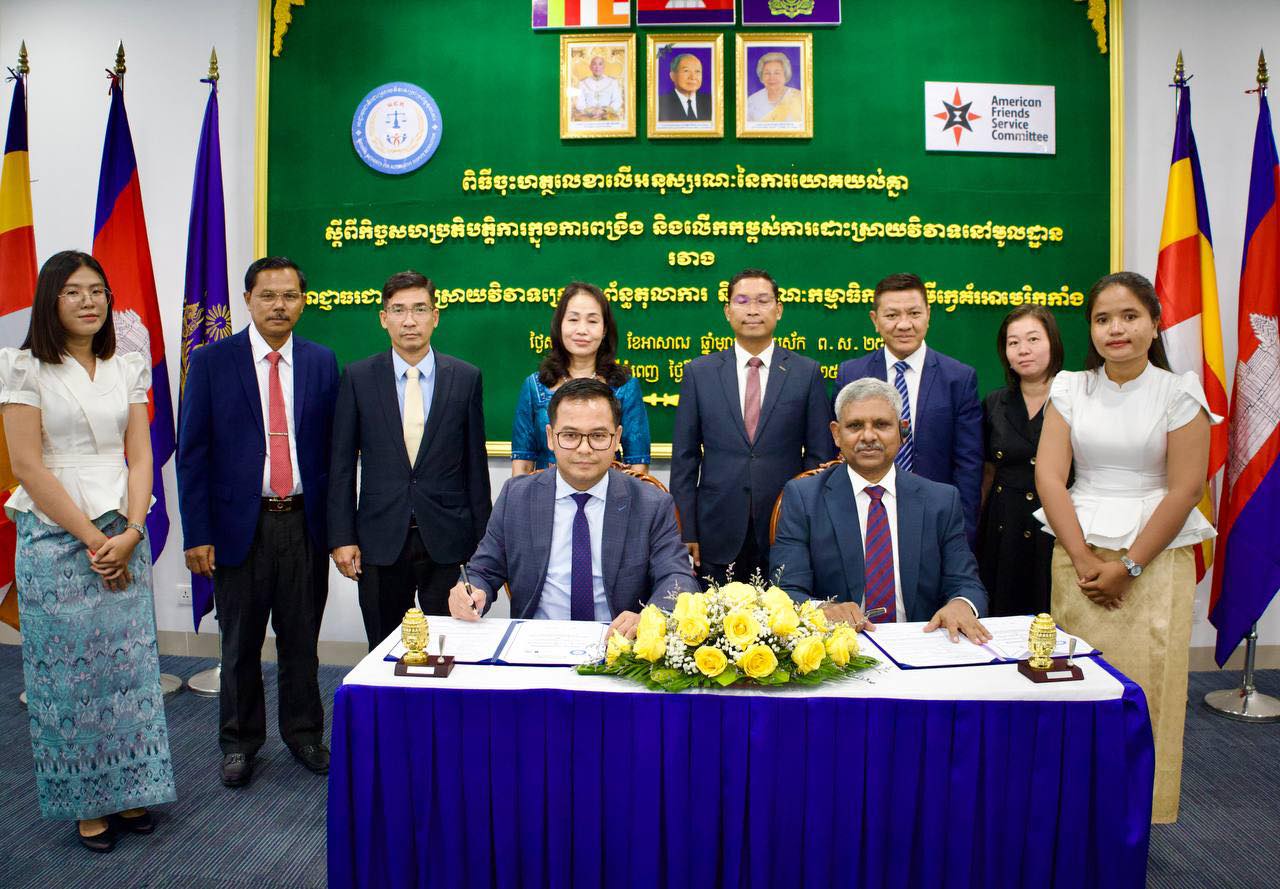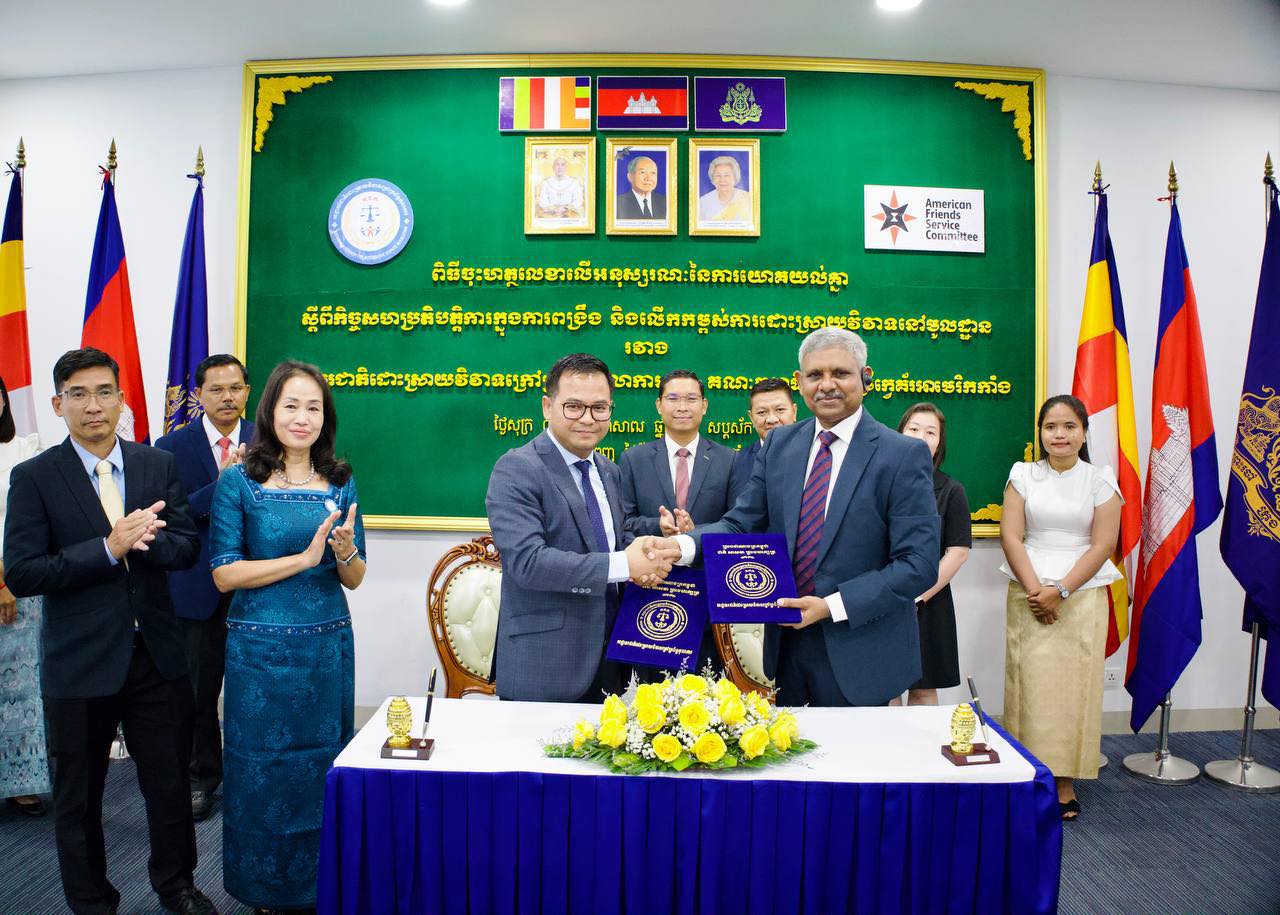
Photo: Cambodia National Authority for Alternative Dispute Resolution
On July 18, 2025, Cambodia’s National Authority for Alternative Dispute Resolution (NADR) and the American Friends Service Committee (AFSC) Asia regional office signed a Memorandum of Understanding (MOU) to strengthen community-based mediation and expand access to justice, particularly for women and vulnerable groups. The agreement underscores a shared commitment to promoting inclusive, non-court dispute resolution mechanisms across the country.
Speaking at the signing ceremony, H.E. Dr. Chin Malin, Secretary of State at the Ministry of Justice and Standing Vice-Chair of NADR, emphasized the significance of the agreement. He reflected on NADR’s recent accomplishments and outlined its strategic direction, calling the MOU a new milestone in the effort to improve access to justice. He highlighted the Cambodian government’s broader vision of making dispute-resolution mechanisms more accessible, diverse, community-centered, and responsive to people’s real needs, especially those in rural and marginalized areas.

Photo: Cambodia National Authority for Alternative Dispute Resolution
The Memorandum of Understanding (MOU) was signed by H.E. Dr. Chin Malin on behalf of H.E. Koeut Rith, Deputy Prime Minister, Minister of Justice, and Chair of NADR, together with Mr. Abid Gulzar, Asia Regional Director of AFSC. The agreement establishes a collaborative framework to strengthen peaceful, constructive, and community-driven approaches to resolving conflict at the grassroots level.
The signing ceremony was graced by several distinguished guests, including H.E. Em Chan Makara, Secretary of State at the Ministry of Justice and NADR member; H.E. Mrs. Chea Veasna, Secretary of State at the Ministry of Justice and NADR member; H.E. Meas Sokeo, Under-Secretary of State at the Ministry of Justice and NADR member; and H.E. Dr. Khlok Dara, Delegate of the Royal Government and Director General of International Affairs and Judicial Development at the Ministry of Justice, also serving as a NADR member. Senior officials from the NADR Secretariat were also in attendance. In addition, around 60 mediation officers took part in the event, reflecting strong national commitment to expanding access to local, non-court dispute resolution services across Cambodia.
In his remarks, Abid Gulzar expressed deep appreciation for NADR’s leadership in advancing peace and justice in Cambodia. “This MOU signifies more than just a formal agreement—it represents a powerful convergence of our shared vision for a more just, peaceful, and equitable Cambodia,” he said.
Abid reaffirmed that AFSC’s work is rooted in core Quaker values of peace, justice, equality, and community. “We believe peaceful ends can only be achieved through peaceful means,” he emphasized. “These are not abstract ideals; they are living principles that guide our work around the world, including in Cambodia.”
He also stressed the value of alternative dispute resolution (ADR) as a vital tool for those underserved by formal justice systems. “ADR offers a path to reconciliation that is culturally sensitive, community-led, and empowering,” Abid said. “It enables people to craft solutions tailored to their own needs, often resulting in more sustainable and meaningful outcomes.”
Highlighting the needs of Cambodia’s diverse and often marginalized communities, Abid noted the importance of strengthening NADR’s presence at the provincial level. “By investing in provincial offices, we’re investing in people, their capacity to resolve disputes peacefully, advocate for their rights, and preserve their cultural wisdom and traditions,” he said. “We’re not just supporting infrastructure; we’re strengthening resilience and inclusion.”
The MoU aims to enhance cooperation between AFSC and NADR under the Ministry of Justice to strengthen and promote local dispute resolution through community-based mediation and improve access to justice for all, especially women and vulnerable groups. Under this MOU, AFSC will collaborate to implement the project entitled “Facilitating Better Access to Local Justice among Indigenous and Remote Communities (FAIR) in Ratanakiri and Stung Treng provinces.
AFSC and NADR share a strong commitment to grassroots peacebuilding. As Abid concluded, “True peace is not merely the absence of conflict, but the presence of justice. By strengthening alternative dispute resolution services, especially for indigenous and rural communities, we are taking a meaningful step toward building a more just and harmonious Cambodia.”